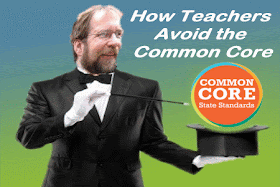How Teachers Avoid the Common Core
Many standards have official gatekeepers. For instance, the National Institute of Standards and Technology in Colorado is the official civilian source for the answer to "What time is it?" through the national atomic clock.
There is no such body for the CCS. When the standards were first unleashed, the official word was that a state could not change a single word of them, and the states could add no more than 15%. The unanswered question was, "Or what...?" There has never been an official body to monitor state use of the standards. The folks who wrote the standards might have fulfilled such a function, but they dispersed almost immediately to new jobs (David Coleman took over the College Board, Jason Zimba booked some consultant gigs, etc). Sure, there's a site where you can look at the standards and read some PR, but it's the equivalent of a business site that won't let you contact the company or order product.
There has never been an official Common Core office to say, "This is correct, but that is not."
The implications for the use of the standards are huge. There is not, for instance, a body that approves whether or not a textbook can call itself "Common Core ready." Some organizations have tried to fill that gap by doing reviews based on textbook alignment to the Core, but those groups are themselves taking an unauthorized stab at what the Core says.
When the Core started finding its way to individual districts and schools, an army of consultants was unleashed to lead sessions on "unpacking" the standards. At these sessions, teachers would be put Continue reading: CURMUDGUCATION: How Teachers Avoid the Common Core

